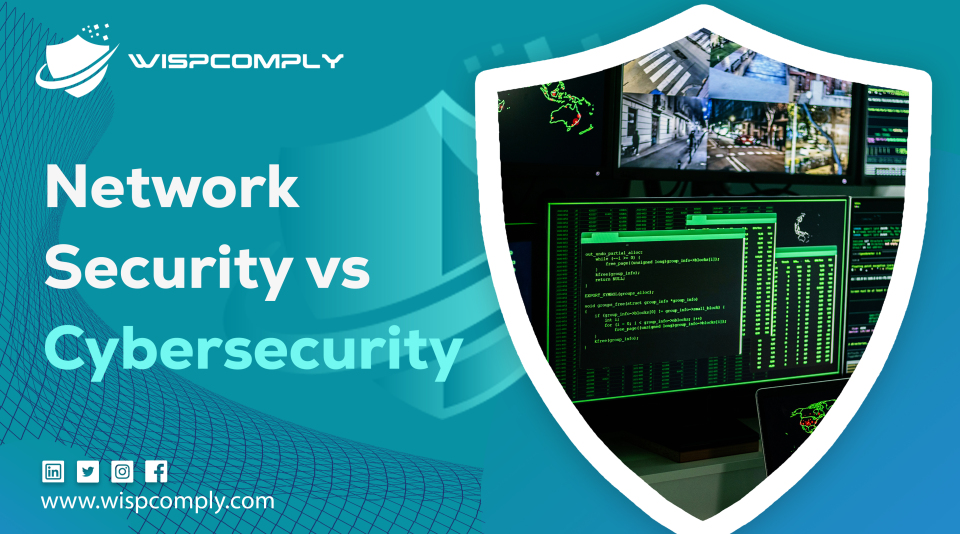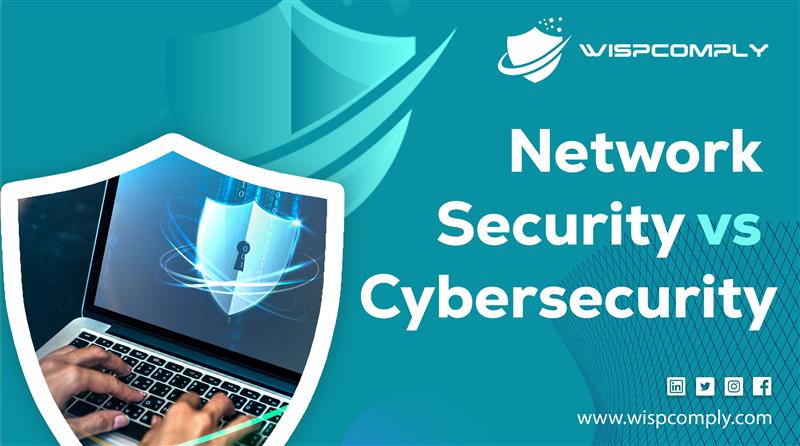
Table of Contents
Network Security vs Cybersecurity: A Detailed Comparison
Everything from schoolwork to billion-dollar business deals happens online. It’s more important than ever to keep our information safe as we spend more and more time online. It’s not just a tech issue anymore to know the difference between network security vs cybersecurity. Cyberattacks, ransomware, and data leaks are making the news every day.
A lot of people confuse the two words or use them as if they mean the same thing. They are very similar, but they each focus on different aspects of keeping our digital world safe. This blog will explain what Network Security and Cybersecurity are, how they work, and why both are important for keeping your data safe. Let’s get going!
Understanding Network Security
Network security is all about protecting your computer network — the system that lets your computers, devices, and servers talk to each other. Think of it like building a wall around a city to keep the bad guys out. Its job is to guard your network’s doors, paths, and secret tunnels.
It focuses on the infrastructure — things like routers, switches, firewalls, and VPNs that allow devices to connect and share information. It helps stop threats before they reach your important data.
Key Components of Network Security
Here are some of the main tools and ideas that help keep networks safe:
- Firewalls: Like digital gates, they block unwanted visitors from entering your network.
- Intrusion Detection & Prevention Systems (IDS/IPS): These systems watch for suspicious behavior and take action fast.
- Virtual Private Networks (VPNs): These secure your online connections, especially for remote work.
- Access Control: Only the right people can get into certain parts of the system.
- Network Segmentation: Splits the network into smaller parts to stop a hacker from accessing everything at once.
Common Network Security Threats
Our digitalized world is full of cyber threats. Here are some that target network security:
- Malware & Ransomware: Harmful software that can damage, steal, or lock your data.
- DDoS Attacks: Overwhelm a system to make it crash or go offline.
- Man-in-the-Middle (MitM) Attacks: Hackers secretly intercept communications.
- Unauthorized Access: When someone gets in without permission — sometimes even an insider.
Why Network Security Matters?
Here are key reasons why network security matters for you:
- Protects Sensitive Data: Stops outsiders from stealing customer or business data.
- Keeps the Business Running: A safe network means no downtime from attacks.
- Meets Rules and Laws: Follows regulations like PCI DSS and HIPAA.
In a world run by telecommunications and digital media, network security is like the foundation of a safe building. Without it, everything else is at risk.
Understanding Cybersecurity
Now, let’s talk about cybersecurity, which is a much broader idea. While network security focuses on the “pipes” and “roads” data travels through, cybersecurity protects everything digital — from your smartphone to cloud services, from apps to online banking.
It includes people, processes, and security technology working together to fight cyber threats and keep data safe. It touches every corner of our digital life, including public safety, data protection, and even national security.
Key Components of Cybersecurity
Here’s what’s included in the vast feild of cybersecurity:
- Information Security: Keeps personal and business info private and accurate.
- Application Security: Protects software and apps from being hacked.
- Endpoint Security: Defends devices like laptops, phones, and IoT gadgets.
- Cloud Security: Secures services like Google Drive or Microsoft Azure.
- Identity & Access Management (IAM): Controls who gets access to what.
Common Cybersecurity Threats
Cyber threats come in many shapes and sizes. Here are a few major ones:
- Phishing & Social Engineering: Tricks you into giving up passwords or data.
- Zero-Day Exploits: Attacks that happen before software makers can fix the weakness.
- Advanced Persistent Threats (APTs): Sneaky, long-term attacks that are hard to spot.
- Data Breaches & Identity Theft: Stealing info to use or sell it.
Why is Cybersecurity Important?
Now, let’s understand why it matters:
- Guards Personal & Business Data: Keeps it from falling into the wrong hands.
- Protects Reputation & Money: One data breach can cost millions.
- Supports Critical Systems: Like hospitals, power plants, and government services.
From cyberpunk themes to real-world disasters, cybersecurity plays a huge role in crime prevention and data laws.

Network Security vs Cybersecurity: Table of Comparison
Feature | Network Security | Cybersecurity |
Scope | Focuses on internal networks | Covers all digital systems |
Goal | Protects the network infrastructure | Protects digital data & devices |
Tools | Firewalls, VPNs, IDS/IPS | IAM, encryption, antivirus, etc. |
Threats | Malware, DDoS, MitM attacks | Phishing, APTs, data theft |
Used By | Network admins | Security experts, IT teams |
Where Network Security vs Cybersecurity Overlap?
Both fields are part of information technology management and work toward one shared goal: secure communication and data safety.
Network security is actually a piece of the cybersecurity puzzle. For example:
- A company may use a firewall (network security) along with encryption (cybersecurity).
- A secure private network works best when combined with endpoint protection.
Together, they create stronger defense systems that fight off cybercrime, fraud, and security breaches.
Which One Does Your Business Need?
Here’s a quick guide to make a wise decision between network security vs cybersecurity:
- Large Networks (like banks or telecom firms) → Strong network security
- Sensitive Data Handlers (like hospitals or law firms) → Robust cybersecurity
- Most Businesses → A mix of both
In fields like service industries, software engineering, and information science, the best approach is a combo of both.
Best Practices for Strong Digital Security
Let’s look at simple ways to boost both network and cybersecurity:
Network Security Best Practices
Explore how to implement the best network security:
- Update Software Regularly: Don’t ignore important patch updates.
- Use Strong Passwords & MFA: Make access tougher for hackers.
- Run Vulnerability Tests: Find weak spots before someone else does.
Cybersecurity Best Practices
Now, use these tips to improve your cybersecurity:
- Train Employees: Help them spot phishing or suspicious activity.
- Use Antivirus & Endpoint Protection: Guard every device.
- Encrypt Sensitive Data: Especially during data transmission or storage.
Combine Your Defenses
- Zero Trust Security: Never assume any connection is safe.
- SIEM Tools: Track and respond to security events.
- Pen Testing: Hire “ethical hackers” to test your systems.
A Unified Threat Management (UTM) system can also bring all these defenses together under one roof.
Future Trends in Network and Cybersecurity
The digital battlefield is evolving. Here are a few things to watch for:
- AI & Machine Learning: Smarter tools to predict and stop attacks.
- Quantum Encryption: Future-proof data security.
- More Cloud & IoT Threats: As devices grow, so do risks.
- Cyberwarfare & Nation-State Attacks: Countries now fight in cyberspace, too.
Industries like military communications, telecommunications law, and systems engineering will have to evolve with these changes.
Final Thoughts
As we’ve seen, comparing network security vs cybersecurity isn’t about picking a winner — it’s about knowing where each one fits. In today’s world of cloud computing, mass media technology, and digital technology, both are needed more than ever.
If you’re managing an organization, working in software, or just care about your online safety, investing in both areas is a smart move. That’s where tools like Wispcomply come in — offering smart solutions to secure your data from every angle.
FAQs
1: Are network security and cybersecurity the same thing?
No, network security is part of cybersecurity. Think of cybersecurity as the big picture and network security as one piece of it.
2: What are the biggest threats today?
Ransomware, phishing, DDoS attacks, and data breaches are among the most dangerous threats today.
3: How can small businesses protect themselves?
Use strong passwords, train employees, install antivirus, and consider a VPN and firewall.
4: Why is cybersecurity important for national safety?
Cybersecurity protects critical systems like power, water, and healthcare from cyberwarfare and espionage techniques.
5: What does the future of cybersecurity look like?
More AI tools, stronger encryption, and advanced policies to fight global cybercrime.
